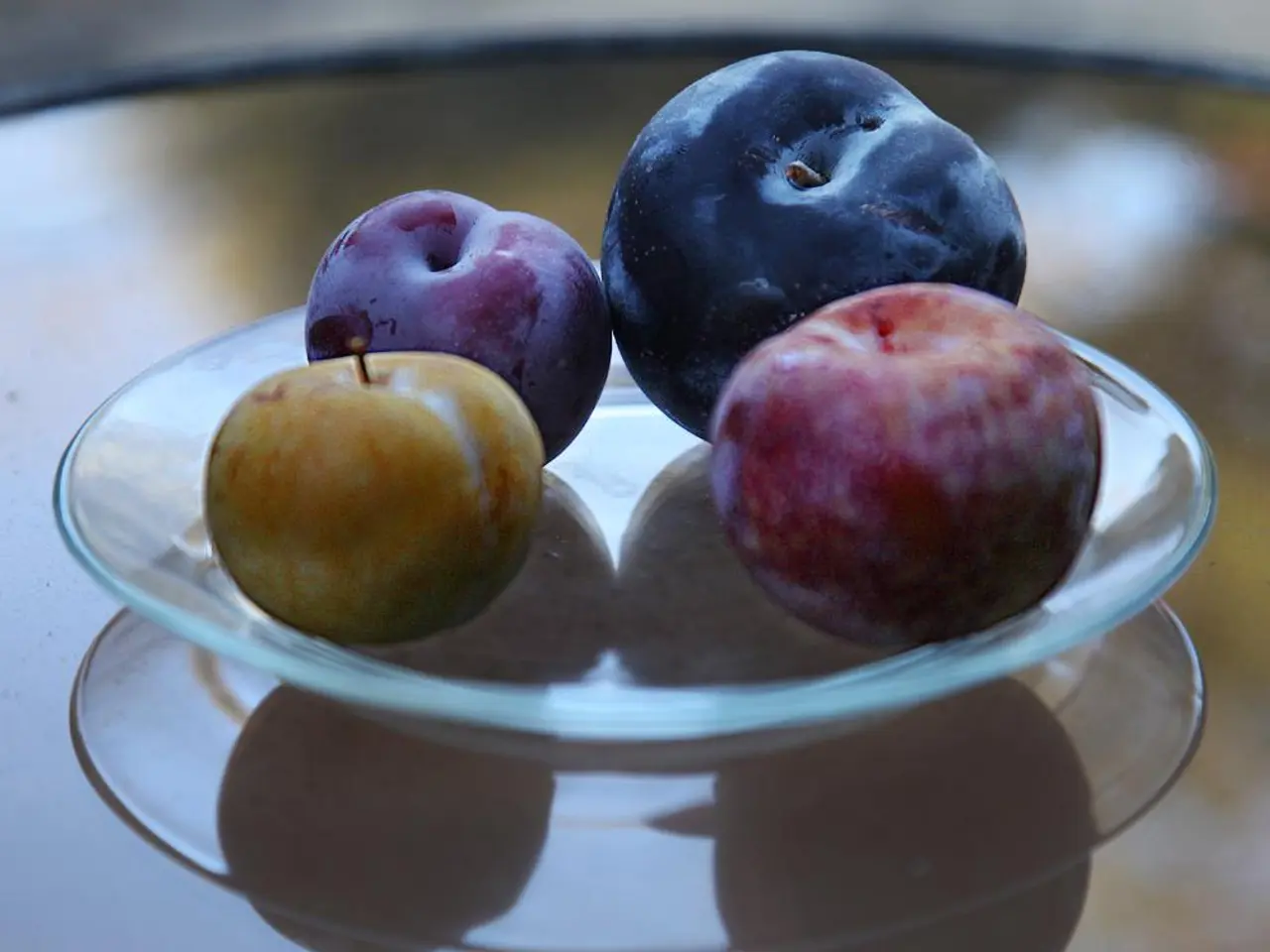Dietary recommendations for individuals with coronary artery disease:
Coronary Artery Disease (CAD), a type of heart disease, can be managed effectively through a heart-healthy diet plan. This eating approach emphasizes a variety of nutrient-rich foods that can improve cardiovascular health and reduce risk factors such as high cholesterol, high blood pressure, and inflammation.
Fruits and Vegetables
Aim to eat a variety of fruits and vegetables daily, focusing on dark green, deep orange, or yellow options like spinach, carrots, peaches, berries, bananas, oranges, apples, and watermelon. Aim for at least five servings per day to gain vitamins, minerals, fiber, and antioxidants that protect the heart.
Whole Grains
Choose whole grains such as oats, whole wheat bread, brown rice, barley, and whole-grain cereals to increase dietary fiber, particularly soluble fiber, which helps lower LDL ("bad") cholesterol.
Plant-Based Proteins
Include plant-based proteins like beans, lentils, soy milk, tempeh, and tofu, which provide heart-healthy nutrition without the saturated fat found in some animal proteins.
Fish
Eat fish at least twice a week, especially oily fish such as salmon, mackerel, sardines, tuna, lake trout, and herring, which are rich in omega-3 polyunsaturated fatty acids beneficial for heart health.
Lean Meats and Poultry
Choose lean meats and poultry such as chicken or turkey breast instead of fatty or processed meats, as processed meats (e.g., bacon, hot dogs, sausage) are linked to higher heart disease risk.
Healthy Fats
Include healthy fats from sources like olive oil, canola oil, soybean oil, sunflower oil, nuts (almonds, walnuts, peanuts), seeds, avocado, and fatty fish. These provide monounsaturated and polyunsaturated fats, which help lower total and LDL cholesterol and provide antioxidants like vitamin E and magnesium.
Limit Saturated and Trans Fats
Limit saturated fats by avoiding butter, lard, fatty cuts of meat, and full-fat dairy. Also avoid trans fats found in many processed and fried foods.
Sodium and Sugar
Limit sodium intake by reducing salt, salty sauces, and processed foods to help control blood pressure. Limit added sugars in food and drinks to maintain a healthy weight and reduce cardiovascular risk.
Alcohol
Limit alcohol consumption to no more than 2 drinks per day for men and 1 for women.
Physical Activity
Increasing physical activity to at least 150 minutes of moderate or 75 minutes of vigorous exercise per week complements dietary efforts to manage CAD.
These guidelines collectively help reduce atherosclerosis progression and cardiovascular events for individuals with CAD. If you require a tailored eating plan, consulting a dietitian or healthcare provider is advised.
In addition to the heart-healthy eating plan, it is recommended to avoid sweetened soda, energy drinks, cakes, cookies, and candies due to their high sugar content. Choosing liquid plant oils such as canola, olive, or corn instead of tropical oils or oils derived from animal fats is a heart-healthy eating tip. Processed foods, premade sauces, and instant products should be avoided due to their high salt content. Eating a variety of vegetables that are fresh, frozen, or from no salt added cans is a heart-healthy eating tip. Choosing whole grain versions of products such as bread, bagels, rice, pasta, and noodles is also beneficial.
Foods that are high in fiber and low in saturated and trans fats, and that also reduce salt and limit sugar intake, can help reduce cholesterol levels. The DASH eating plan, a heart-healthy eating program, has been shown to reduce the risk of developing heart disease, including CAD. Following a heart-healthy eating plan can help a person with CAD to keep their blood pressure low and reduce cholesterol levels. Eating foods with high saturated fat and trans fat content may contribute to heart disease, including CAD. Choosing low or no fat dairy versions of milk, cheese, cream, and yogurt is a heart-healthy eating tip.
Examples of foods to eat for a heart-healthy eating plan include leafy greens, broccoli, bananas, oranges, brown rice, oatmeal, eggs, lean meats, fish, nuts, seeds, yogurt, cheese, canola oil, olive oil, walnuts, avocados, tofu, and lentils. Choosing lean cuts of beef and pork and avoiding eating chicken and turkey skin is also a heart-healthy eating tip. Foods to eat for a heart-healthy eating plan include fruits and vegetables, whole grains, foods high in protein, low or no fat dairy products, foods high in monounsaturated and polyunsaturated fats, and foods high in fiber. Processed meat products, fried foods, fatty cuts of meat, butter, and cream should be avoided as they are high in saturated and trans fats. Eating legumes such as beans and peas is also a heart-healthy eating tip.
- Dark green, deep orange, or yellow fruits and vegetables, such as spinach, carrots, peaches, berries, bananas, oranges, apples, and watermelon, should be eaten daily for their heart-protecting vitamins, minerals, fiber, and antioxidants.
- Whole grains like oats, whole wheat bread, brown rice, barley, and whole-grain cereals should be chosen to increase dietary fiber, particularly soluble fiber, which helps lower LDL ("bad") cholesterol.
- Plant-based proteins, such as beans, lentils, soy milk, tempeh, and tofu, can provide heart-healthy nutrition without saturated fat commonly found in some animal proteins.
- Fish, especially oily fish like salmon, mackerel, sardines, tuna, lake trout, and herring, should be eaten at least twice a week for omega-3 polyunsaturated fatty acids that benefit heart health.
- Lean meats and poultry, such as chicken or turkey breast, are better choices over fatty or processed meats, as the latter are linked to higher heart disease risk.
- Healthy fats from sources like olive oil, canola oil, soybean oil, sunflower oil, nuts, seeds, avocado, and fatty fish provide monounsaturated and polyunsaturated fats, which aid in lowering total and LDL cholesterol and provide antioxidants like vitamin E and magnesium.
- Saturated and trans fats, found in products like butter, lard, fatty cuts of meat, full-fat dairy, and many processed and fried foods, should be limited to reduce cholesterol levels, lower the risk of developing heart disease, and maintain overall heart health.




